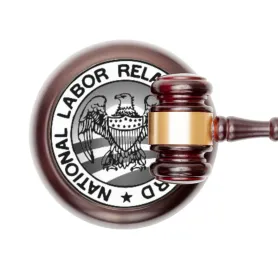The current National Labor Relations Board (NLRB or Board) continues to take steps toward reversing union-friendly Obama-era NLRB rules and regulations. Previously, the Board sought public comment on whether it should change the NLRB rules and regulations established in 2015, also referred to by some as the “Ambush Election” Rules or “Quickie Election” Rules.
On Aug. 12, 2019, the Board published a Notice of Proposed Rulemaking involving Representation Election procedures (Proposed Rule). The Proposed Rule is consistent with the Board’s use of formal notice-and-comment rulemaking to reshape labor law. It seeks to modify three policies that currently simplify unions’ ability to achieve and retain their status as the exclusive representative of employees for the purpose of collective bargaining: (1) the use of unfair labor practice charges to block petitions for a decertification election, (2) the use of voluntary recognition to prevent challenges to a union’s majority status via NLRB election procedures, and (3) the use of collective bargaining agreement language to convert a construction industry pre-hire agreement into a Section 9(a) collective bargaining relationship without an NLRB election or a showing of majority status.
Blocking Charge Policy
Currently, unions can block petitions for election by filing unfair labor practice charges. This strategy – which is especially prone to abuse when decertification petitions are filed – interferes with employees’ National Labor Relations Act (NLRA) Section 7 rights to oust their collective bargaining representatives. The Board notes that the current blocking charge policy can “preclude holding the petitioned-for election for months, even years, if at all.”
The Proposed Rule would replace the current blocking charge policy with a vote-and-impound procedure. Under the new rule, elections would no longer be blocked by pending unfair labor practice charges. Instead, the election would be allowed to proceed, and the ballots would be impounded until the charges are resolved. According to the Board, “the proposed [rule] best satisfies the goal of protecting employee free choice in cases where, under existing policy, the election would be blocked by assuring that petitions will be processed to an election in the same manner as in unblocked petition cases.”
Voluntary Recognition Bar
Under the existing rules, an employer’s recognition of a union precludes the possibility of conducting a Board election to challenge the initial recognition of a union as the employees’ exclusive bargaining representative for up to four years.
The Proposed Rule would return to the rule established in Dana Corp., 351 NLRB 434 (2007). Bargaining unit employees would be required to receive notice that voluntary recognition has been granted and would be given a 45-day period within which to file an election petition. According the Board, “[t]his modification does not diminish the role that voluntary recognition plays in the creation of bargaining relationships but ensures that employee free choice has not been impaired by a process that is less reliable than Board elections.”
Construction Industry
Section 8(f) of the NLRA allows unions and employers in the construction industry to enter into lawful “pre-hire” agreements prior to the union achieving majority status. This section was established to protect workers in the construction industry, who often perform project-driven work of a short duration and would not have the opportunity to avail themselves of union representation absent a pre-hire agreement. Currently, contract language alone can convert a Section 8(f) agreement into a full-fledged Section 9(a) collective bargaining agreement. Essentially, a trade union and an employer can enter into a labor contract agreeing that the union will act as the employees’ exclusive representative for the purpose of collective bargaining without going through a voluntary recognition procedure or an NLRB election.
The Proposed Rule would require actual proof of majority status before a Section 8(f) contract could be turned into a Section 9(a) agreement. Under the new rule, proof of a Section 9(a) relationship will require positive evidence of majority employee support and cannot be based on contract language alone. According to the Board, this rule will “restore the employee protections of employee free choice in the construction industry…”
Takeaways
This appears to be only the beginning of the current Board’s use of rulemaking to overhaul current representation rules. The rules being targeted interfere with employee rights to challenge a union’s majority status. Similarly, the 2015 changes to the NLRB Rules and Regulations adversely impacted employers’ ability to communicate with employees during organizing drives by significantly reducing the amount of time between the filing of a representation petition and an election. Employers should expect the current Board to engage in further rulemaking efforts.
The Board will accept public comments regarding the proposed rule until Oct. 11, 2019.




 />i
/>i

